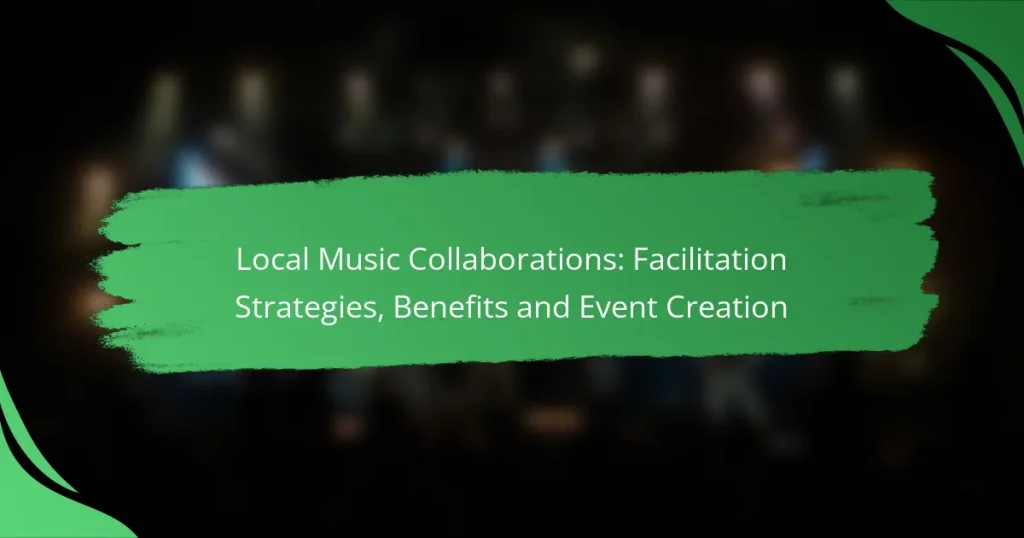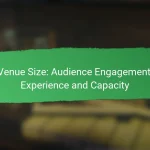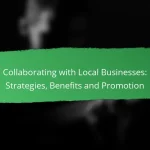Local music collaborations can significantly enrich the artistic landscape by connecting musicians with venues and community resources. These partnerships not only foster community ties and enhance artist visibility but also introduce diverse musical styles, creating a vibrant scene that benefits everyone involved. To successfully create local music events, careful planning, effective marketing, and strong community engagement are essential.
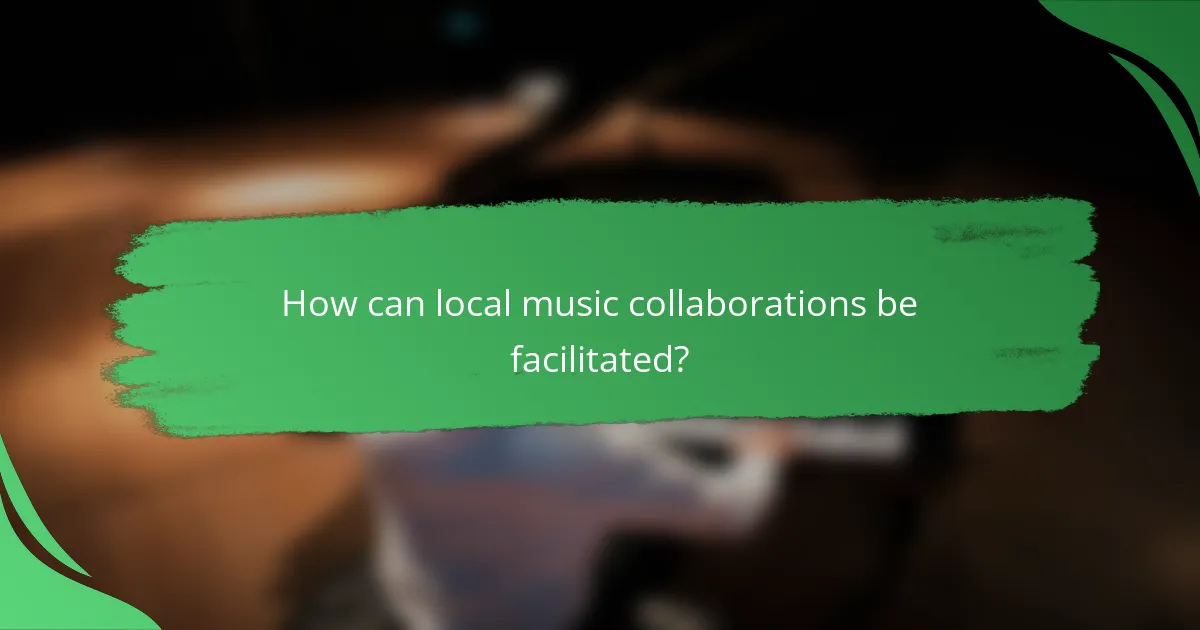
How can local music collaborations be facilitated?
Local music collaborations can be facilitated through strategic approaches that connect artists, venues, and community resources. By leveraging existing spaces, social media, educational institutions, and local businesses, musicians can create meaningful partnerships that enhance their projects.
Utilizing community music spaces
Community music spaces serve as vital hubs for collaboration, providing venues for rehearsals, performances, and networking. These spaces often offer affordable rental rates or even free access for local artists, making them an ideal starting point for collaboration.
Consider reaching out to local community centers, co-working spaces, or dedicated music venues to establish partnerships. Organizing open mic nights or jam sessions can foster connections among musicians and encourage spontaneous collaborations.
Leveraging social media platforms
Social media platforms are powerful tools for facilitating local music collaborations by allowing artists to showcase their work and connect with others. Platforms like Instagram, Facebook, and TikTok enable musicians to share their music, promote events, and find collaborators within their local scene.
To maximize engagement, artists should regularly post updates, collaborate on content, and use relevant hashtags to reach a broader audience. Creating dedicated groups or events on these platforms can also help organize meet-ups and collaboration opportunities.
Partnering with local music schools
Local music schools can be excellent partners in fostering collaborations among musicians. By connecting with educators and students, artists can tap into a pool of talent eager to collaborate on projects, performances, or workshops.
Consider offering workshops or masterclasses at these institutions, which can lead to collaborative opportunities with students and faculty. Additionally, schools often have resources and venues that can be utilized for events, enhancing the collaborative experience.
Engaging local businesses for sponsorship
Local businesses can play a crucial role in supporting music collaborations through sponsorships or partnerships. By engaging with businesses that align with the music scene, artists can secure funding, resources, or promotional support for their projects.
Approach businesses with a clear proposal outlining the benefits of collaboration, such as increased visibility and community engagement. Consider hosting joint events or offering promotional opportunities in exchange for sponsorship, creating a win-win situation for both parties.
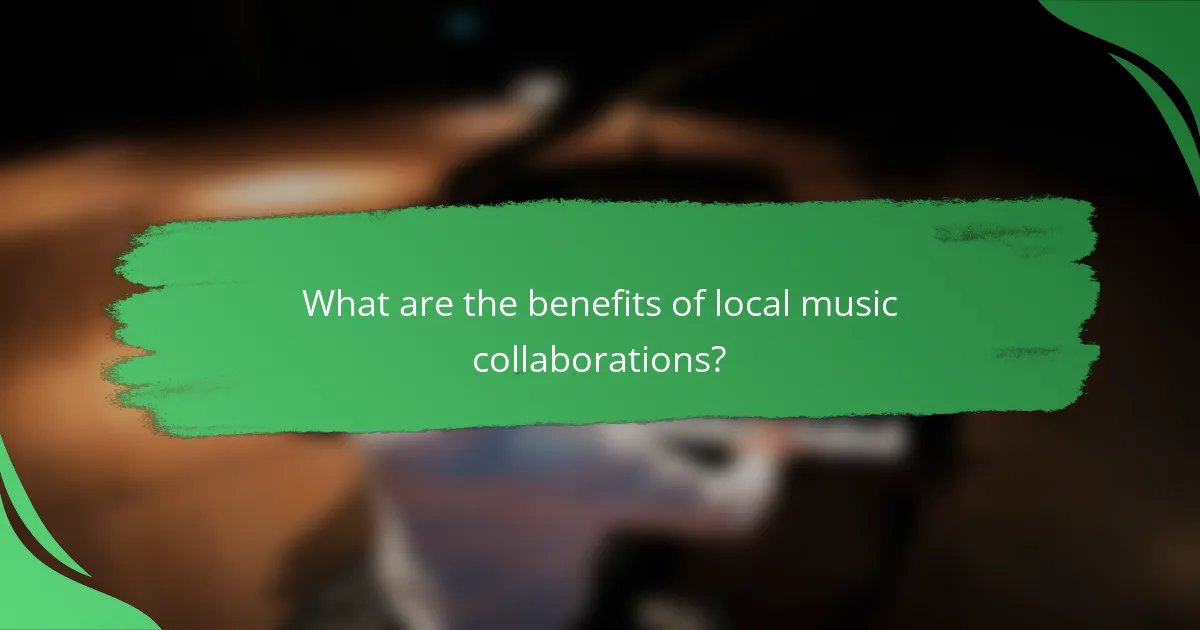
What are the benefits of local music collaborations?
Local music collaborations offer numerous advantages, including fostering community ties, enhancing visibility for artists, and introducing diverse musical styles. These partnerships can create a vibrant music scene that benefits both musicians and their audiences.
Enhanced community engagement
Local music collaborations significantly boost community engagement by bringing people together through shared musical experiences. Events such as concerts, festivals, and workshops encourage participation and foster a sense of belonging among residents.
To maximize engagement, consider partnering with local businesses and organizations. This can create a supportive network that promotes events and attracts a wider audience, enhancing the overall community spirit.
Increased exposure for local artists
Collaborations provide local artists with increased exposure, helping them reach new audiences and potential fans. By working together, musicians can leverage each other’s networks, promoting their music through shared platforms and events.
Artists should actively seek collaboration opportunities, such as open mic nights or joint performances, to showcase their talents. This not only enhances their visibility but also builds valuable connections within the local music scene.
Access to diverse musical influences
Engaging in local music collaborations allows artists to access a variety of musical influences, enriching their own creative processes. Exposure to different genres and styles can inspire innovation and lead to unique musical fusions.
Musicians should embrace collaborations with artists from diverse backgrounds, as this can lead to fresh ideas and broaden their artistic horizons. Participating in workshops or community jam sessions can facilitate these interactions and spark new creative directions.
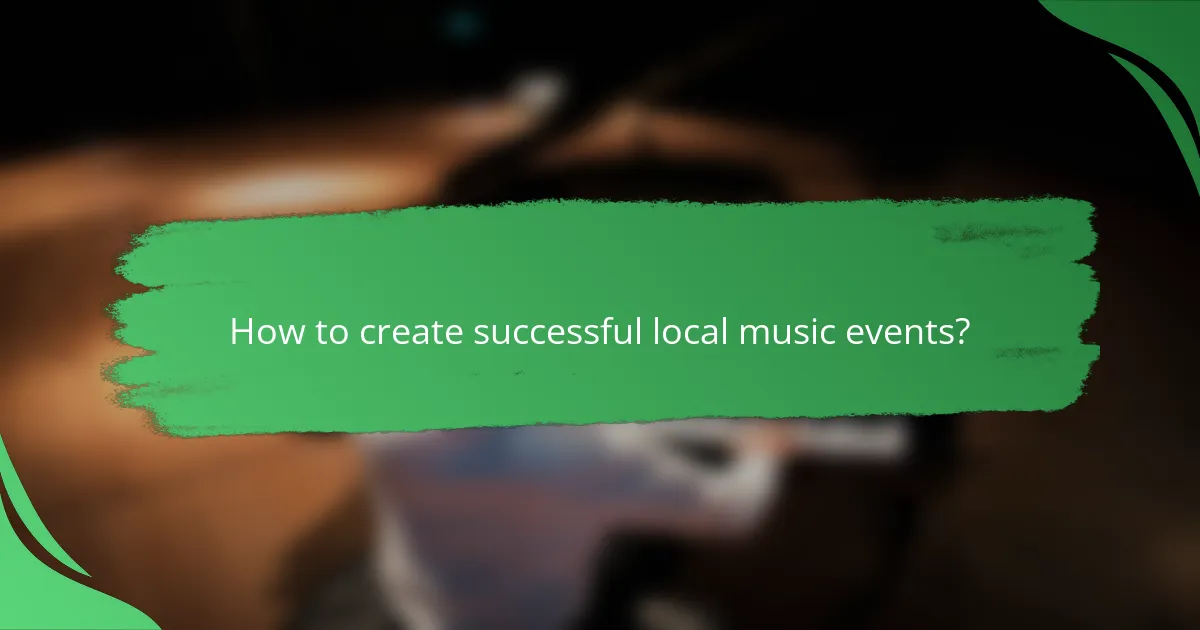
How to create successful local music events?
Creating successful local music events involves careful planning, effective marketing, and strong community engagement. Focus on selecting the right venue, implementing targeted marketing strategies, and collaborating with local influencers to enhance visibility and attendance.
Choosing the right venue
Selecting an appropriate venue is crucial for the success of local music events. Consider factors such as capacity, acoustics, location, and accessibility. Venues should be easily reachable by public transport and have adequate parking options.
Popular choices include community centers, local bars, and outdoor spaces, depending on the expected audience size. Ensure the venue aligns with the music genre and atmosphere you aim to create.
Effective marketing strategies
Implementing effective marketing strategies is essential to attract attendees. Utilize social media platforms, local event calendars, and community boards to promote the event. Create engaging content that highlights the artists and the unique aspects of the event.
Consider using targeted ads to reach specific demographics. Collaborate with local businesses for cross-promotion, and offer early bird ticket discounts to incentivize purchases.
Collaborating with local influencers
Partnering with local influencers can significantly boost your event’s visibility. Identify influencers within the music scene or local community who resonate with your target audience. They can help promote the event through their channels, reaching a wider audience.
Engage influencers by offering them exclusive access or incentives, such as free tickets or backstage passes. Their endorsement can lend credibility and attract more attendees to your event.
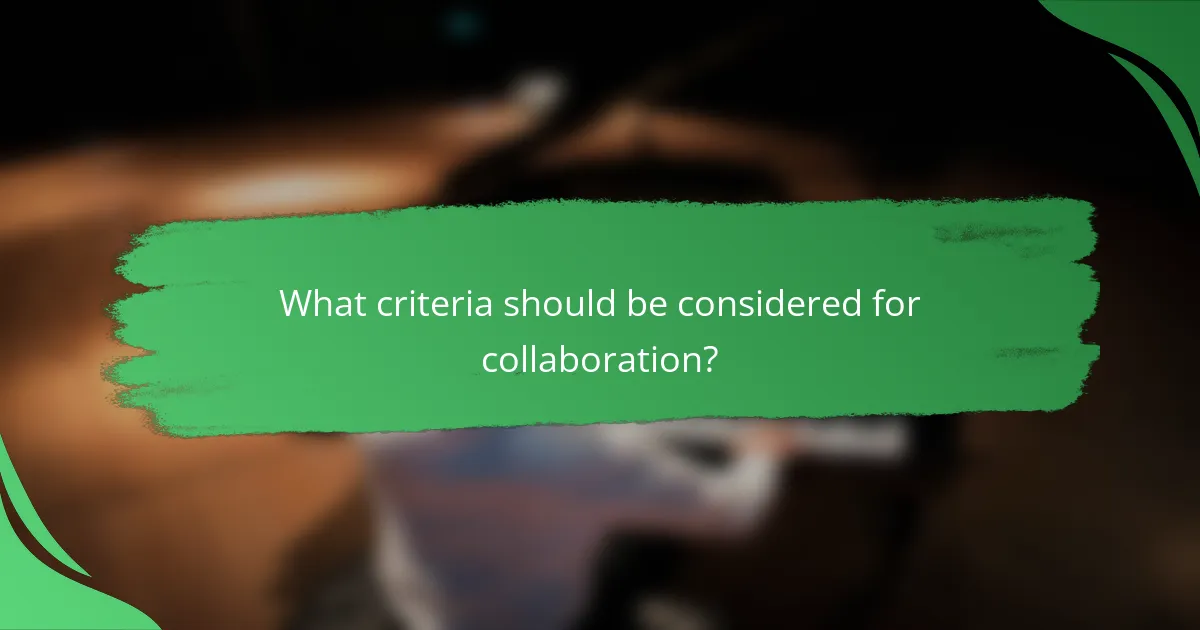
What criteria should be considered for collaboration?
When considering collaboration in local music, key criteria include artist compatibility, shared goals, and logistical factors. Evaluating these elements ensures a productive partnership that aligns with the creative vision and operational needs of all involved artists.
Artist compatibility
Artist compatibility is crucial for successful collaboration. This involves assessing musical styles, genres, and personal dynamics. For example, a pop artist may find synergy with an electronic producer, while a folk musician might connect better with a jazz instrumentalist.
Additionally, consider the personalities and work ethics of the artists. A collaborative environment thrives when artists respect each other’s creative processes and can communicate openly. Regular discussions about expectations can help avoid misunderstandings.
Shared goals and vision
Establishing shared goals and a unified vision is essential for collaboration. Artists should discuss what they hope to achieve, whether it’s creating a single, an album, or performing live. Aligning on artistic direction and target audience can streamline decision-making throughout the process.
It’s beneficial to document these goals to keep everyone accountable. For instance, if the aim is to reach a specific demographic or to explore a new sound, having this clarity can guide the creative process and marketing strategies.
Logistical considerations
Logistical considerations encompass scheduling, budgeting, and resource allocation. Artists need to coordinate their availability to ensure consistent collaboration, which may involve setting regular meeting times or studio sessions.
Budgeting is another critical aspect; artists should agree on how to share costs for recording, promotion, and events. A simple budget outline can help track expenses and prevent financial disputes. Additionally, understanding local regulations regarding performances and copyright can avoid legal complications.
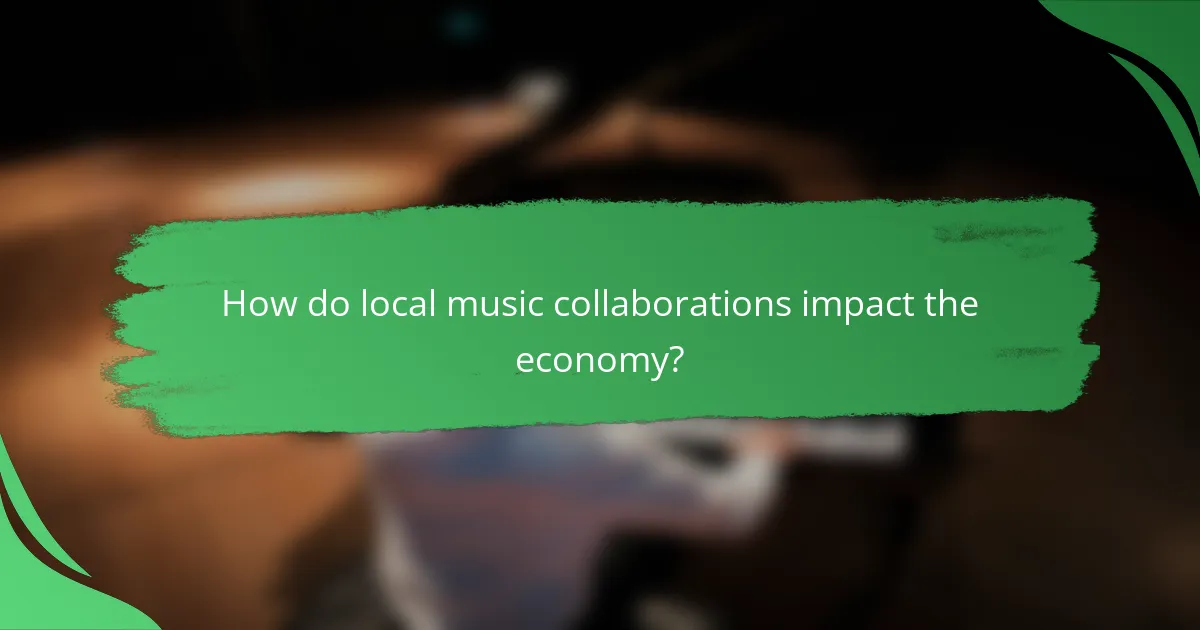
How do local music collaborations impact the economy?
Local music collaborations significantly boost the economy by driving tourism, creating jobs, and supporting local businesses. These collaborations foster a vibrant cultural scene that attracts visitors and stimulates economic activity within the community.
Boosting local tourism
Local music collaborations can enhance tourism by attracting visitors to concerts, festivals, and other events. When musicians collaborate, they often create unique experiences that draw in audiences from outside the area, increasing hotel bookings and local dining.
For example, a music festival featuring local artists can lead to a surge in visitors, benefiting nearby hotels and restaurants. Communities can leverage these events to promote local attractions and create packages that encourage longer stays.
Creating job opportunities
Collaborations in the music scene often lead to the creation of various job opportunities, both directly and indirectly. Musicians, sound engineers, event organizers, and venue staff all benefit from increased activity in the local music industry.
Moreover, as music events grow, they may require additional support staff, such as security and marketing professionals. This ripple effect can significantly reduce local unemployment rates and foster a more robust job market.
Supporting local businesses
Local music collaborations can provide a substantial boost to nearby businesses, including restaurants, bars, and retail shops. When music events take place, attendees often spend money at these establishments, leading to increased sales and revenue.
Additionally, local businesses can partner with musicians for sponsorships or promotions, creating a mutually beneficial relationship. For instance, a coffee shop might host open mic nights, drawing in customers while supporting local talent.
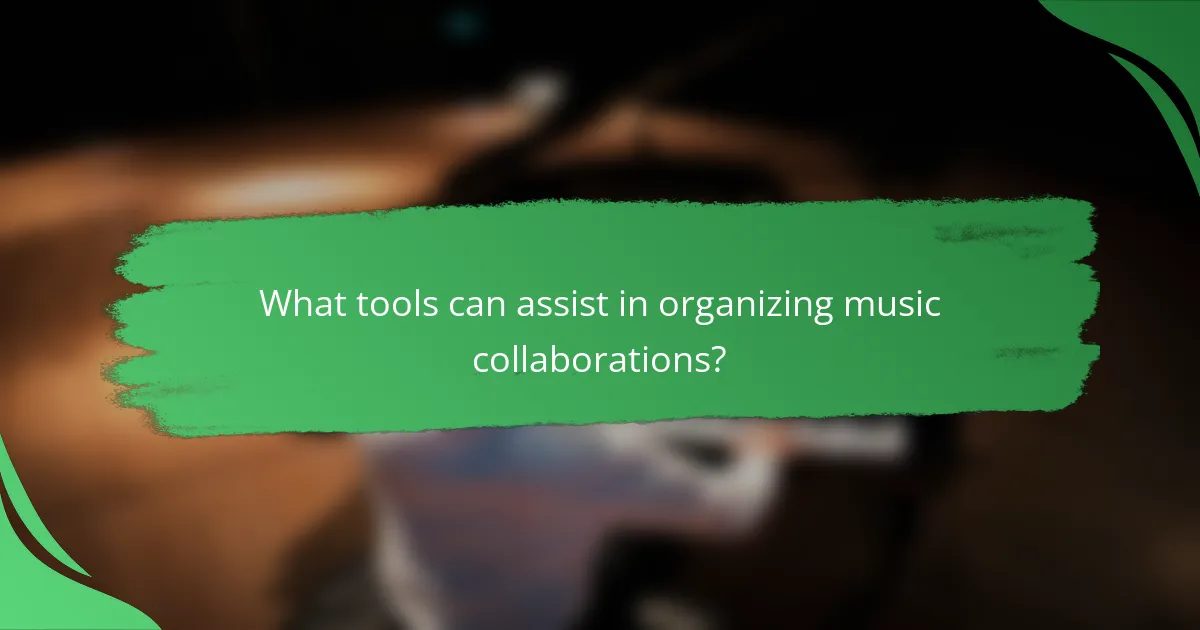
What tools can assist in organizing music collaborations?
Several tools can streamline the organization of music collaborations, enhancing communication and coordination among artists. These tools range from event management software to collaborative platforms that facilitate scheduling and resource sharing.
Event management software
Event management software simplifies the planning and execution of music collaborations by providing features for scheduling, ticketing, and promotion. These platforms often include tools for managing guest lists, tracking RSVPs, and facilitating communication between collaborators.
Popular options include Eventbrite, which is user-friendly for ticketing and event promotion, and Asana, which helps teams manage tasks and deadlines. When choosing software, consider factors like ease of use, integration with other tools, and pricing, which can range from free to several hundred dollars per month based on features.
To maximize effectiveness, ensure all collaborators are trained on the chosen software. Regularly update event details and maintain open lines of communication to avoid confusion and ensure a smooth collaboration process.
